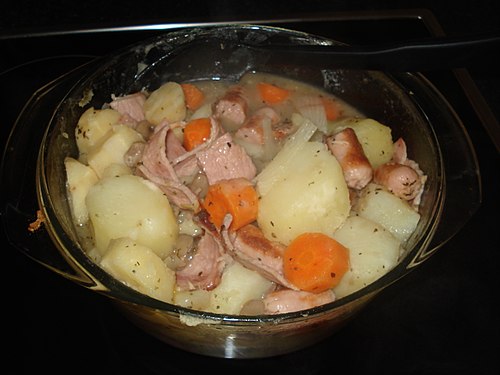Coddleverb
(transitive) To treat gently or with great care.
Coddleverb
(transitive) To cook slowly in hot water that is below the boiling point.
Coddleverb
(transitive) To exercise excessive or damaging authority in an attempt to protect. To overprotect.
Coddlenoun
An Irish dish comprising layers of roughly sliced pork sausages and bacon rashers with sliced potatoes and onions.
Coddlenoun
(archaic) An effeminate person.
Coddleverb
To parboil, or soften by boiling.
Coddleverb
To treat with excessive tenderness; to pamper.
Coddleverb
treat with excessive indulgence;
Coddleverb
cook in nearly boiling water;
Coddle
Coddle (sometimes Dublin coddle; Irish: cadal) is an Irish dish which is often made to use up leftovers, and therefore without a specific recipe. However, it most commonly consists of layers of roughly sliced sausages (pork sausages) and rashers (thinly sliced, somewhat-fatty back bacon) with chunky potatoes, sliced onion, salt, pepper, and herbs (parsley or chives).
Cuddlenoun
A snuggle; an affectionate embrace, often given to family members and close friends.
Cuddleverb
(intransitive) To embrace affectionately, lie together snugly.
Cuddleverb
(transitive) To cradle in one's arms so as to give comfort, warmth.
Cuddleverb
To lie close or snug; to crouch; to nestle.
Cuddleverb
To lie close or snug; to crouch; to nestle.
Cuddleverb
To embrace closely; to fondle.
Cuddlenoun
A close embrace.
Cuddlenoun
a close and affectionate (and often prolonged) embrace
Cuddleverb
move or arrange oneself in a comfortable and cozy position;
Cuddleverb
hold (a person or thing) close, as for affection, comfort, or warmth;







